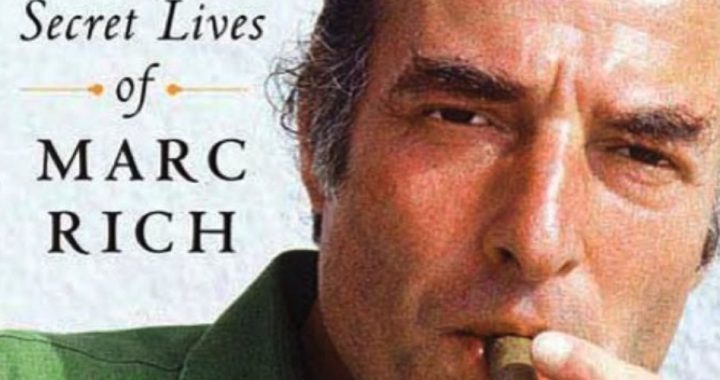
In announcing the death of 78-year-old international oil trader Marc Rich (shown), commentators around the world nearly ran out of descriptors, calling him “friend,” “pioneer,” “colorful,” “great,” “controversial,” a “buccaneer,” the “King of Oil,” and the “King of Commodities.” Others weren’t so kind, calling him a “traitor,” a “tax evader,” and a “racketeer.”
His impact as a trader in the world commodity market was profound. He learned to trade oil and other commodities at the age of 20 at Phillip Brothers (now called Phibro) where he met his future partner, Pincus “Pinky” Green. After a disagreement over the amount of bonuses they were owed, Rich and Green left Phibro and started their own company, Marc Rich and Company AG, in 1974, just in time to recognize and profit from the 1973 oil embargo. By being quick on their feet and taking advantage of contacts at the highest levels of governments worldwide, Rich was able to match needs with demands and take a commission in the process.
Following the Iran hostage crisis in 1979, for instance, Rich was able to deliver oil from Iran and the Soviet Union to the apartheid regime in South Africa in exchange for uranium from Namibia, which was sold back to the USSR. As the Wall Street Journal noted: “Over two decades … Mr. Rich’s involvement in the firm … grew [it] into a global trading and mining giant.” That modest assessment missed the impact of Rich and Green. His company was sold to its management in 1994 and then merged with another commodity trading firm, Xstrata, and last year the combined companies did $214 billion in business, and employed 140,000 people worldwide.
Rich gained national attention when his trading activities caught the eye of the new U.S. attorney in Manhattan, Rudolph Giuliani, who, after investigating Rich’s activities, secured more than 50 indictments against him for fraud, racketeering, and tax evasion in September 1983. The next year, after failing to persuade Giuliani that he was innocent, Rich fled to Switzerland, where he lived out the rest of his life. On his own website, Rich defended himself:
These transactions, which also involved major U.S. oil companies … were not unlike many other transactions widely engaged in during this period. In accordance with the law and following the advice of competent counsel, payments attributable to the offshore aspects of the linked transactions were properly treated as exempt from U.S. taxes….
The U.S. Attorney investigating the matter ambitiously turned the proper reporting treatment of these complex corporate transactions — essentially a routine tax allocation dispute — into a highly politicized criminal tax and energy fraud case alleging that domestic oil revenues were improperly diverted offshore….
Shortly after the conclusion of the case against the companies in 1984, the U.S. Department of Energy itself reached conclusions supporting the manner in which the challenged transactions were originally reported.
Despite his claims of innocence, Rich’s U.S.-based affiliates paid nearly $200 million in fines, and the FBI put Rich onto its “most-wanted” list for nearly a decade. After several attempts to arrest Rich failed, the case disappeared from public view.
Until January 20, 2001, that is, when President Bill Clinton, on his last day in office, granted Rich a presidential pardon. This erupted into a scandal known as “Pardongate,” but by that time, nothing could be done, and Rich could relax at his villa (“La villa rose”) overlooking Lake Lucerne.
In a rare and revealing interview lasting more than 30 hours in November 2009, with the business editor of a Swiss newspaper, Rich spelled out just how he had managed not only to make himself extremely wealthy, but avoid being prosecuted by Giuliani. It was very simple: He bribed top government officials who helped him do “workarounds” on existing embargoes while providing espionage tips to his contacts in those governments. In essence, Rich had an enormously influential network of powerful people dependent upon him for their existence and their financial well-being.
Said interviewer Daniel Ammann, “The biggest advantage of Marc Rich and his company is that they were on the spot. They weren’t dealing from the U.S. or Switzerland. They were on the spot.” He added:
Let’s say Iran after the 1979 revolution. They were there. In Angola, Cuba, Jamaica, South Africa. There were always his people working with the local authorities. The commodity trade is often done by governments so they really had the best contacts imaginable.
When Rich was paying big bribes to buy and sell the stores of commodities from entire nations, he made sure he was paying off all the right people and depositing the money into all the right offshore bank accounts for those people, all the time.
This sheds light on Clinton’s defense of his pardon of Rich when he said he was influenced by pleas for clemency from Ehud Barak, Israel’s former prime minister and Shimon Peres, then (and now) the president of Israel. During the oil embargo following the hostage crisis, it was Rich who was able to sell embargoed Iranian oil to its enemy, Israel. In such a crisis, enemies become friends, and Rich’s successful providing of oil to Israel was remembered by his friends. Explained Amman:
Rich was the very needed and useful intermediary. He was the one who brought their oil to the customer and converted it into foreign currencies. I really think they needed him as much as he needed them. This is sort of the principle of trading.
Of course, the fact that Denise Rich, Rich’s wealthy socialist wife, gave hundreds of thousands of dollars to the Clinton library fund and to Hillary Clinton’s run for the senate didn’t hurt, either.
Rich was indeed all of the descriptors offered by commentators around the world at the news of his death from a stroke in Lucerne at age 78. Rich was a major player. All he did was what George Washington Plunkitt, the Tammany Hall politician, did: “I seen my opportunities and I took ’em.” Rich just did it on a far grander scale.
A graduate of Cornell University and a former investment advisor, Bob is a regular contributor to The New American magazine and blogs frequently at www.LightFromTheRight.com, primarily on economics and politics. He can be reached at [email protected].



